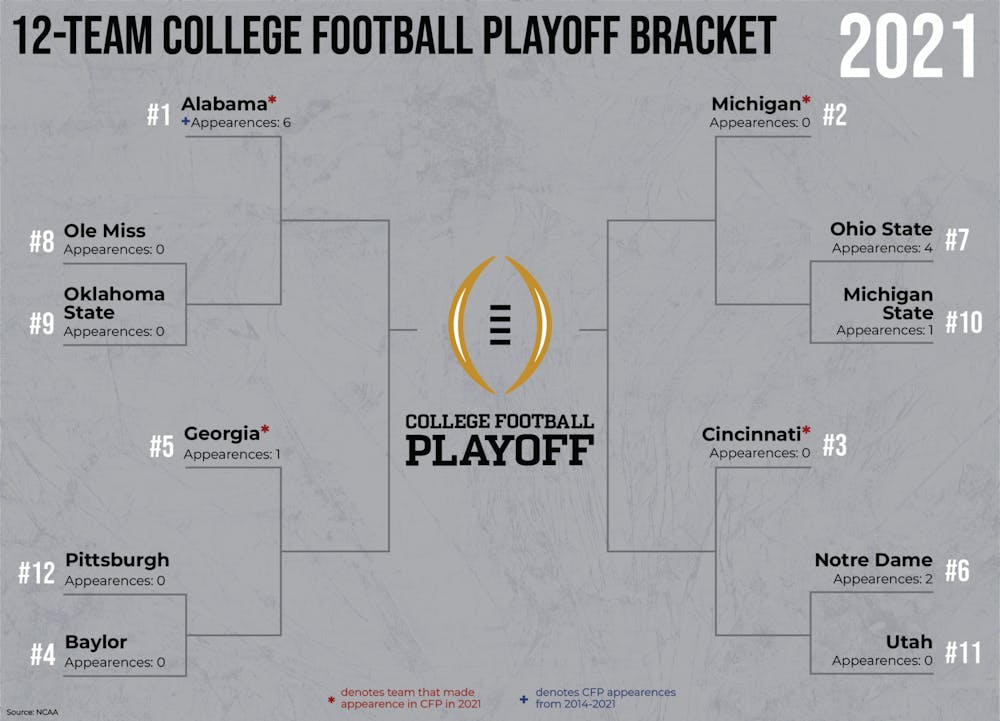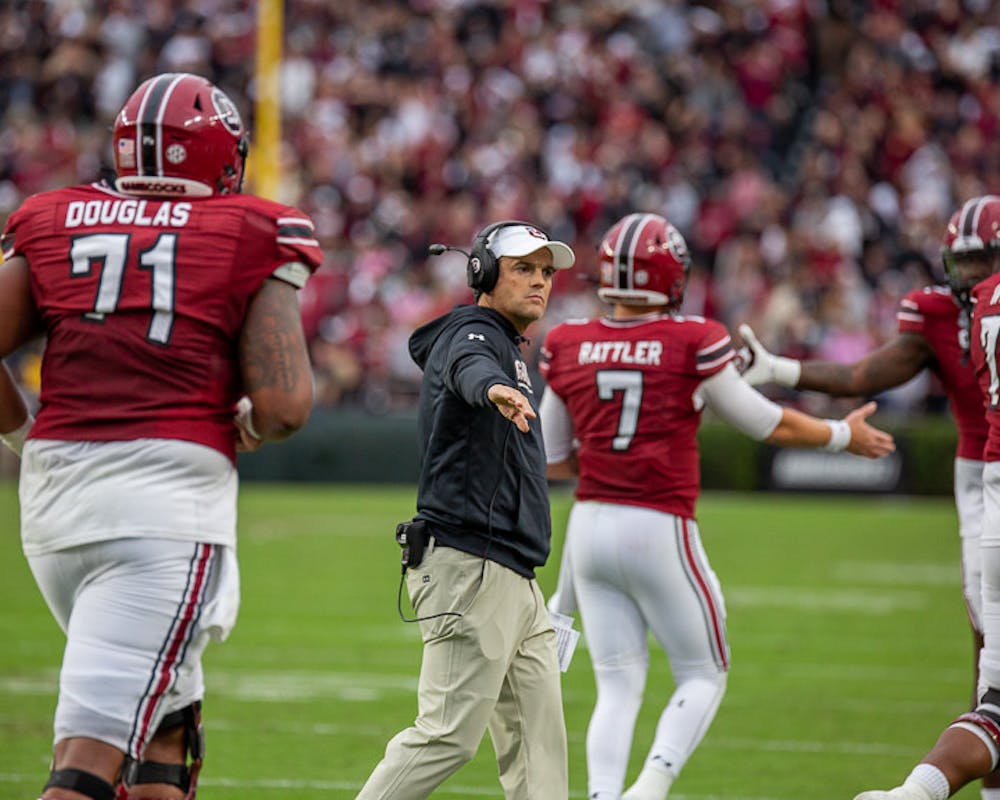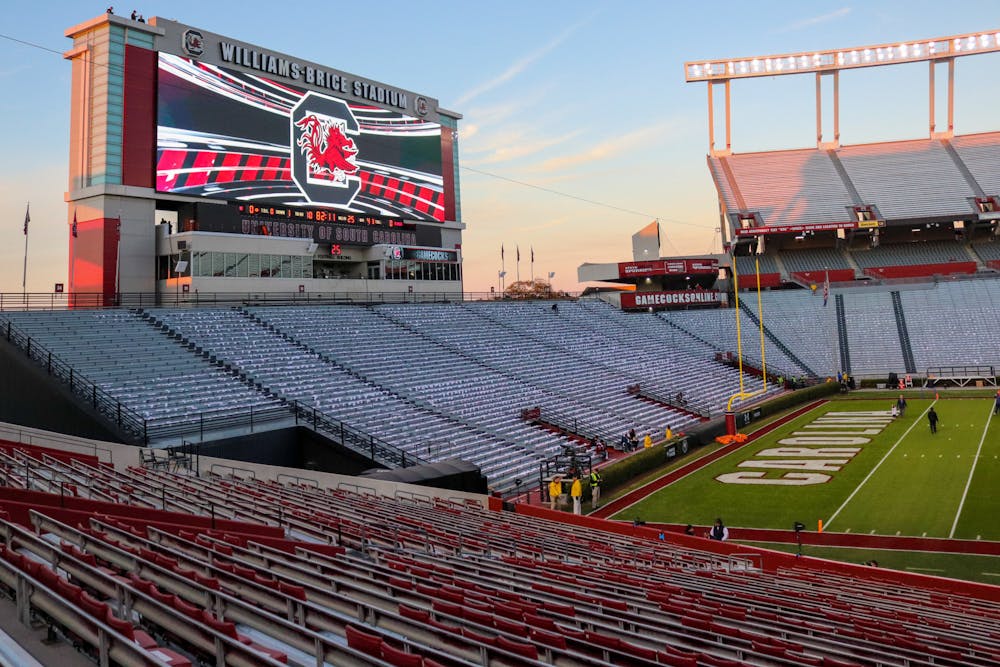The 12-team College Football Playoff (CFP) format, as opposed to the original four-team configuration and a proposed eight-team format, was the best option the CFP's Board of Managers could have chosen due to the benefits it will provide to Football Bowl Subdivision (FBS) programs and other entities.
The CFP announced on Thursday it would increase to 12 teams for the 2024 and 2025 seasons after approving a measure to implement the new format beginning in 2026 on Sept. 2 of this year. As a result, college football fans across the country now have to wait less time for a national championship race that will extend the excitement surrounding the sport with another eight meaningful games.
An expanded playoff will also increase the likelihood of South Carolina’s football team competing for a national championship, something the university has yet to do in the CFP era.
Rumors of expansion have been swirling since the College Football Playoff was first implemented in 2014. A survey conducted by ESPN at the time showed that 44% of the 103 FBS head coaches surveyed wanted an eight-team playoff and 17% wanted a 16-team playoff.
Discussions over expansion began to heat up this past June when the four members of the CFP working group — which included representatives of the SEC, Big 12, Mountain West and Notre Dame — proposed the 12-team format.
Three months later, the format was accepted by the managing committee, which consists of university presidents representing each of the 10 FBS conferences and the president of Notre Dame, whose football team currently does not belong in any conference.

The 12 teams featured in the expanded format will include the six highest-ranked conference champions and six more teams receiving at-large bids. Each of the Power 5 conferences —the ACC, Big Ten, Big 12, Pac-12, and SEC — will see their conference champions earn an automatic place in the playoff. The highest-ranked champion from the Group of 5 conferences — the AAC, Conference USA, MAC, Mountain West, and Sun Belt — will also be represented. The remaining at-large slots will be filled by the next six teams ranked highest in the final CFP rankings, which are released after all regular season and conference championship games have been played.
In the playoff bracket, the four highest-ranking conference champions receive a bye to the quarterfinals, and the other eight teams must play against each other in the opening round. Those teams will be seeded five through 12 based on their CFP ranking at the end of the season, regardless of whether they won a conference championship.
A 12-team playoff format will feature the best mixture of conference champions and high-quality teams unable to clinch a conference title. By including at least one Group of 5 team each season, this playoff format will also give traditionally underappreciated and underrepresented teams the chance to compete for a national championship.
Dr. Richard Southall, a sport management professor and director of the College Sport Research Institute, said the committee’s reasoning for expanding the playoff was rooted in one thing: money.
“It's the same reason that playoffs have been expanded in professional sport,” Southall said.
The format will also increase the diversity of a tournament that has not experienced much of it throughout its existence. Out of the 131 current FBS teams, only 13 have made it to the playoff, with two of them — Michigan and Cincinnati — making their first appearances in 2021. An expanded format that year would have seen five more teams — Baylor, Ole Miss, Oklahoma State, Utah and Pittsburgh — compete in the playoff for the first time.
By increasing the playoff field through expansion, the playoff committee would enhance the popularity of the sport by creating entertaining and action-packed matchups as well as giving more teams the opportunity to demonstrate their quality and unique identity on a national stage.
Sports media lead professor Dr. Kevin Hull said giving more teams the opportunity to compete for a national championship would be a "win-win for everybody."
Expanding the CFP will also reward teams for winning conference championships by giving them an automatic berth into the playoff, which are staples of NCAA tournaments for other sports like men’s and women’s basketball. Conference champions oftentimes make up the majority of teams in the playoff, but some teams' conference titles do not result in CFP selections.
At least one Power Five champion has been left out of every playoff, and in 2021, three of those teams – Baylor, Utah and Pittsburgh – were not selected to compete in the College Football Playoff, but all would’ve been included in a larger bracket.
The addition of more teams could curtail diminishing television viewership, an issue that has affected the CFP in recent years. Viewership estimates released by the CFP indicate that the average number of viewers for its games declined over the past three years, likely because of fans getting tired of watching the same teams compete each season.
Expanding the playoff could potentially reverse that trend just by attracting new fanbases and increasing the possibility of upsets, which are often more entertaining than blowout games with high margins of victory. This, in turn, will give media outlets more coverage opportunities to generate buzz surrounding the playoff, according to Hull.
Hull said college athletics programs are the “front porch of the university” because of their visibility through the media and said giving universities increased exposure could give universities higher enrollment and donations through the "Flutie effect", which he said was among the first examples of how universities could benefit from their football teams.
“(Former quarterback Doug Flutie) throws the long Hail Mary, Boston College wins, and their enrollment skyrockets in the year afterwards,” Hull said. “They think it’s because Boston College was everywhere, and they were on TV all the time … and we’ve seen it in all these other places since.”
One entity that could oppose expansion is the SEC, which has established a stronghold on bids in the playoff's early history. The SEC has been represented by at least one team in each of the eight editions of the playoff and is the only conference to be represented by multiple teams in the same season in multiple years.
However, Southall said there are benefits the SEC could derive from an expanded playoff, including the opportunity to have even as many as four teams in the running for a national championship.

South Carolina head football coach Shane Beamer has also voiced his opinions about the potential new format. Despite complacency with the current four-team bracket, he said choosing deserving teams is what is ultimately most important.
“(I) like it the way it is now. That’s certainly been very good for the SEC. Commissioner Sankey said that — we’re fine with four, we showed that last year,” Beamer said. “But I think anything that gives more teams the opportunity to compete for the championship is good, and making sure you get the best teams in there.”

